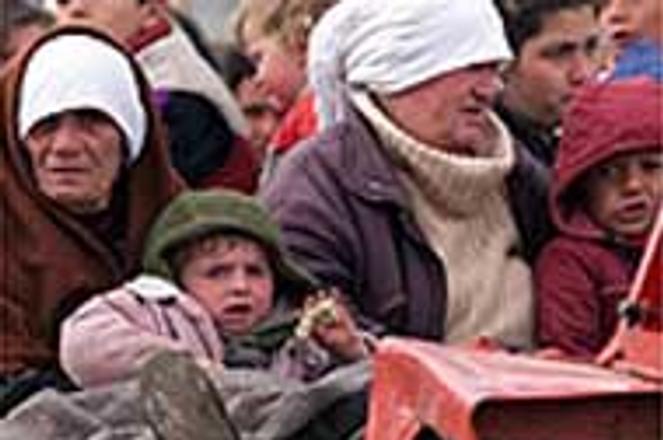Ethnic Albanians driven from Kosovo arrive at the northern Albanian town of Kukes after NATO strikes begin. Slovakia has offered to house 500 refugees in Slovak camps and has pledged food and other aid to the conflict-ridden region.photo: TASR
The government of Prime Minister Mikuláš Dzurinda has allocated 84 million crowns ($2.04 million) to open a camp for at least 500 Kosovo refugees and send humanitarian aid to the refugees seeking safety in Albania and Macedonia.
Five days after the money was granted on April 9, the Parliament passed a resolution supporting Dzurinda's standpoint towards NATO over sharp objections from the opposition, which prolonged parliamentary debates on the matter for two weeks by criticising the cabinet for allowing NATO bombers and fighter jets to fly over Slovak soil.
Opposition deputies from the Movement for a Democratic Slovakia (HZDS) party and the far-right nationalist Slovak National (SNS) party took turns lobbing the majority of the 334 debate comments, some of which charged that the government was bringing Slovakia into a war against the innocent citizens of Yugoslavia.
"The bombing attacks are performed with incredible cruelty. The bombs kill innocent people," HZDS deputy Dušan Slobodník proclaimed on the parliament floor.
Ready to accept refugees
A dozen ethnic Albanian refugees like these women have arrived in the Slovak Republic.photo: TASR
Opinions remain divided on the merits of the bombing among both politicians and Slovak citizens. But there has been strong general support for humanitarian aid to help the Kosovo Albanians, more than 600,000 of whom are estimated to have been made refugees by the conflict.
The cabinet earmarked 39.5 million Sk ($950,000) from its reserves to re-open a refugee camp in Gabčíkovo, which was previously used for refugees from Bosnia. The money will be used to finance the stay of approximately 500 ethnic Albanians for a minimum period of six months.
"The actual number of the refugees could exceed 1,000 people, as we suppose that they will arrive in several waves depending on how the military conflict in Kosovo develops," said Ján Michalko, Office Director at the Interior Ministry, at an April 12 press conference.
As of April 15, however, only a dozen refugees had arrived. They were provided shelter at permanent refugee camps in western Slovak villages of Adamov and Brezová pod Bradlom.
The money will be also used to provide the refugees in Slovakia with food, accommodation, health care, and education, Michalko said. "The Immigration Office will also be able to provide schooling for the children in their mother tongue, but if they are interested they could even learn Slovak language," he added.
If the crisis is still going on six months from now, the refugees could be allowed to remain, Michalko said.
The government will not be alone in dealing with the plight of the numerous refugees. A number of non-government and humanitarian organizations have said they will assist Slovakia with its refugee camps, including the United Nations.
Mária Čierna, director of public relations with the Office of the United Nations High Commissioner for Refugees, said that the refugees in Slovakia would be given "long-term psychological assistance, because from our previous experience, many people might arrive psychologically distressed and suffering from trauma," she told The Slovak Spectator.
Čierna also said that problems might occur among the refugees if they come from different ethnic groups or religions. "But we're prepared to split them to minimalize the risks of potentially problematic situations," she said.
Apart from the refugee camps in Slovakia, the Interior Ministry will also provide clothing, tents and stretchers worth 4.5 million crowns ($107,000) to refugees in Albania and Macedonia. Up to 40 million crowns ($950,000) of direct humanitarian aid in the form of food and medical supplies will come from yields of the Slovak state lottery.
According to government spokeswoman Miriam Fiťmová, Slovakia's humanitarian aid will mainly consist of Slovak-made sugar, powdered milk, cooking oil and canned food to the refugee camps in Albania and Macedonia.
Parliament regretfully behind bombings
The resolution finally passed by Parliament on the Kosovo situation was delayed by accusations that Prime Minister Dzurinda failed to notify the public or ask for parliamentary support before approving the use of Slovak air space for NATO fighter jets and bombers. The parliament found out about the approval almost a week after it was granted.
The final vote on the adoption of the pro-NATO resolution was 77 deputies in favor and 13 against, with 24 abstaining. The final version of the resolution states that respecting human rights is no longer a purely internal affair of a country but also a concern of the international community, which couldn't passively observe the ethnic cleansing of Albanians in Kosovo. It also states regrets that efforts to solve the Kosovo crisis by peaceful means failed, thus forcing NATO to use violent methods to enforce a peace agreement.


